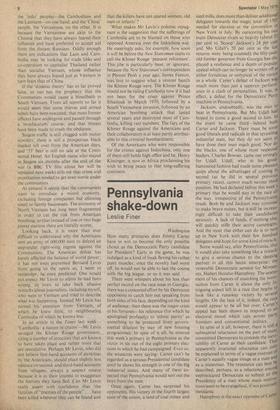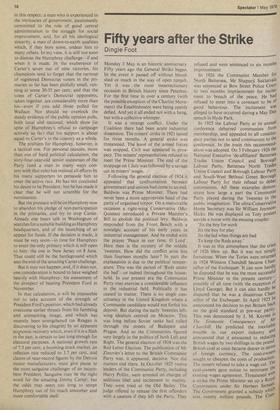Pennsylvania shake-down
Leslie Finer
Washington How many primaries does Jimmy Carter have to win to become the only possible choice as the Democratic Party candidate for President ? Early in the game, he was indulged as a kind of freak flexing his rather puny muscles: once the novelty had worn off, he would not be able to last the course with the big league, or so it was said.
There were whispers about his less than perfect record on the race issue in Georgia; there was a concerted effort by his Democrat opponents to catch him out speaking from both sides of his face, depending on the kind of audience; then there was the major crisis in his fortunes—his reference (for which he apologised profusely) to 'ethnic purity' as , something to be protected from governmental dilution by way of new housing programmes. In spite of it all, he entered this week's primary in Pennsylvania as the victor in six out of the eight primary elections in which he had campaigned. Even so, the wiseacres were saying: Carter can't be regarded as a serious Presidential candidate until he shows his strength in one of the big industrial states. And many of them expected that Pennsylvania would sort out the boys from the men.
Once again, Carter has surprised his opponents. His victory in the fourth largest state of the union, a land of coal mines and
steel mills, does more than deliver addition delegates towards the magic total of 150 needed for election at the convention 1 New York in July. By outscoring his tw main Democrat rivals so heavily (about 3 per cent to `Scoop' Jackson's 24 per cell and Mo Udall's 20 per cent as the la returns were being counted), the fifty-year
old former governor from Georgia has diS. played a resilience and a depth of popular
appeal which can no longer be written off as either fortuitous or untypical of the natioilas a whole. Carter's defeat of Jackson w much more than just a superior performance in a clash of personalities. It was, in) effect, a defeat for the Democratic PartY1 machine in Pennsylvania. Jackson, undoubtedly, was the man to.1 beat in Pennsylvania. But Mo Udall had hoped to come a good second to him. in the event he came third—behind both, Carter and Jackson. There must be sofle. good liberals and radicals in that sprawling; industilial state, but they do not seem to have done their man much good. Nor do the blacks, one of whose most respected leaders, Charles Bowser, came out stronglY for Udall. Udall, who in his goodhumoured fashion had made some pleasant . quips about the advantages of coming in second (as he did in several previots. primary races), cannot much .savour third. position. He had declared before this week's, primary that he would stay in the race all the way, irrespective of the Pennsylvania result. Both he and Jackson may continue'. to make brave noises, but it will be increasingly difficult to take their candidaciesseriously. A lack of funds, if nothing else,. will quickly stifle their active campaigns. And the most that either can do is to turn up in New York with their few hundred delegates and hope for some kind ofmiracle.: Some would say, after Pennsylvania, that it would also take something like a miracle to give a serious chance to the sleeping partner in all this hectic enterprise: the venerable Democratic senator for Minnesots, Hubert Horatio Humphrey. The assess.° ment of his chances of snatching the nomination from Carter is about the only intriguing aspect left in a race that begins to look like a runaway victory by several lengths. On the face of it, indeed, the race would appear to be all but over. Carter's appeal has been shown to respond, to an electoral mood which cuts across party frontiers and conventional politics.
In spite of it all, however, there is still a ; substantial reluctance on the part of manYc I
committed Democrats to concede the inevi'; tability of Carter as their candidate. That t I apparently irrational reluctance can onll be explained in terms of a vague mistrust (3, , Carter's equally vague image as a man all. . as a statesman. The resistance can best K, described, perhaps, as a reluctance arnonC sophisticated Democrats to submit to the,: Presidency of a man whose main motiva*.' tions seem to be evangelical, if not posit ivelYi/
in this respect : a man who is experienced in the intricacies of government, passionately committed to the role of good central administration in the struggle for social improvement, and, for all his ideological sincerity, a man of down-to-earth qualities which, if they bore some, endear him to many others. In my view, it is still too soon to dismiss the Humphrey challenge—if and when it is made. In the exuberance of Carter's seven out of nine victories, his champions tend to forget that the turnout of registered Democrat voters in the primaries so far has been pitifully small, running at some 30-35 per cent; and that the votes of Carter's Democrat opponents, taken together, are considerably more than his—even if you add those polled for Wallace. Nor should we overlook the steady evidence of the public opinion polls, both local and national, which show (in spite of Humphrey's refusal to campaign actively so far) that his support is about equal to Carter's in the country as a whole.
The problem for Humphrey, however, is a tactical one. For personal reasons, more than out of hard political calculation, the sixty-four-year-old senior statesman of the Party (and a man in many ways content with that role) has resisted all efforts by his many supporters to persaude him to enter the active race. He has not concealed his desire to be President: but he has made it clear that he will not scramble for the nomination.
But the pressure will behn Humphrey now to abandon his pledge of non-participation in the primaries, and try to stop Carter. Already one hears talk in Washington of searches for a suitable building as Humphrey headquarters, and of the launching of an appeal for funds. If the decision is made, it must be very soon—in time for Humphrey to enter the only primary which is still open to him: the one in New Jersey on 8 June. That could still be the battleground which sees the end of the amazing Carter challenge.
But it may not happen, and, if it does not, one consideration is bound to have weighed heavily with Humphrey: his assessment of the prospect of beating President Ford in November.
In that calculation, it will be impossible not to take account of the strength of President Ford's position, which had already overcome earlier threats from his fumbling and uninspiring image, and which has recently been strengthened (as Reagan is discovering to his chagrin) by an apparent eccinomic recovery which, even if it is a flash in the pan, is certain to last long enough for electoral purposes. A national growth rate of 7.5 per cent, a booming stock market, an inflation rate reduced to 3.7 per cent, and claims of near-record figures by the Detroit motor manufacturers, must give pause to the most sanguine challenger of an incumbent President. Sanguine may be the right word for the amazing Jimmy Carter; but the odds may seem too long to tempt Humphrey out of his much smoother and _ more comfortable shell.



































 Previous page
Previous page